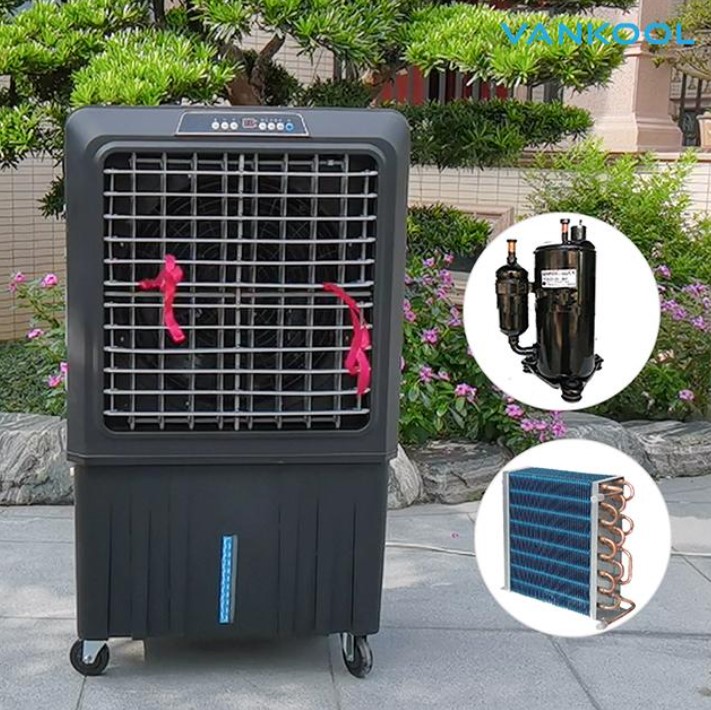Understanding the Efficiency and Benefits of Evaporative Air Conditioners

In hot and dry climates, air conditioning can be a lifesaver, providing a cool and comfortable indoor environment. One type of air conditioner that has gained popularity in recent years is the evaporative air conditioner. This type of air conditioner is also known as a swamp cooler or desert cooler, and it works by evaporating water to cool the air.
Evaporative air conditioners are especially popular in arid regions, where they can be more efficient and cost-effective than traditional air conditioning units. In this article, we’ll take a closer look at how evaporative air conditioner work, their advantages and disadvantages, and some tips for maintaining and using them.
How Evaporative Air Conditioners Work
Evaporative air conditioners work by using a fan to draw hot, dry air through a wetted pad. The pad is made of a porous material that is saturated with water. As the air passes through the wet pad, it picks up moisture and becomes cooler. The cooled air is then circled once again into the room.
One of the main benefits of evaporative air conditioning is that it uses less energy than traditional air conditioning units. This is because it relies on the natural process of evaporation to cool the air, rather than using electricity to cool refrigerant. Evaporative air conditioners also use less water than traditional air conditioning units, making them more environmentally friendly.
Advantages of Evaporative Air Conditioners
There are several advantages to using an evaporative air conditioner. One of the biggest advantages is that they are more energy-efficient than traditional air conditioning units. This means that they can help you save money on your energy bills, especially during the hot summer months when you might be running your air conditioner frequently.
Another advantage of evaporative air conditioners is that they can be more effective in dry climates. This is because they add moisture to the air as they cool it, which can help to alleviate symptoms of dry skin, dry eyes, and other respiratory issues that are common in arid climates.
Evaporative air conditioners are also relatively easy to install and maintain. They don’t require a lot of complicated ductwork or refrigerant lines, which means that they can be installed quickly and easily. They also don’t have a lot of moving parts, which means that they are less likely to break down and require expensive repairs.
Evaporative air conditioners, also known as swamp coolers, are a type of air conditioning system that works by evaporating water to cool the air. While these systems can be effective in certain climates, they also have some disadvantages, including:
- High humidity: Evaporative air conditioners add moisture to the air as part of the cooling process. In humid climates, this can make the air feel even more muggy and uncomfortable.
- Limited effectiveness in humid climates: In areas with high humidity, evaporative air conditioners are much less effective at cooling the air. This is because the air is already saturated with moisture, making it more difficult for the evaporative process to work.
- Limited cooling capacity: Evaporative air conditioners are generally less effective at cooling large spaces compared to traditional air conditioning systems. They are the most appropriate for little to medium-sized rooms.
- Water usage: Evaporative air conditioners use water as part of their cooling process, which means they require a constant supply of water to operate. This can be a disadvantage in areas with limited water resources.
- Maintenance: Evaporative air conditioners require regular maintenance to keep them running properly. This includes cleaning the filters and water reservoir to prevent the growth of bacteria and mold.
- Noise: Some evaporative air conditioners can be noisy, especially if the fan is running at high speed. This can be a disadvantage in quiet environments such as bedrooms or offices.
- Smell: If the water in the system is not changed frequently, evaporative air conditioners can produce an unpleasant smell as bacteria and mold grow in the water reservoir.
Evaporative air conditioners are a type of cooling system that works by passing warm air through a wetted pad, which causes the water to evaporate and lowers the temperature of the air. This technology is particularly useful in arid climates, where traditional air conditioning units can be inefficient and costly.
One of the main benefits of evaporative air conditioners is their energy efficiency. These units consume less electricity compared to traditional air conditioners, as they only use a fan and a pump to circulate water. Additionally, they do not rely on refrigerants or other harmful chemicals, making them more environmentally friendly.
Another advantage of evaporative air conditioners is their ability to add moisture to the air, which can be beneficial for those living in dry climates. They can also improve indoor air quality by filtering out dust and other particles.
However, evaporative air conditioners may not be suitable for all climates. They work best in dry regions with low humidity, as high humidity can hinder the evaporation process and reduce their effectiveness. They also require a constant supply of water to operate, which may not be readily available in all areas.
In conclusion, evaporative air conditioners offer a cost-effective and environmentally friendly alternative to traditional air conditioning units in arid regions. They provide a range of benefits, including energy efficiency, improved indoor air quality, and the addition of moisture to the air. While they may not be suitable for all climates, they are certainly worth considering for those living in areas with low humidity.


